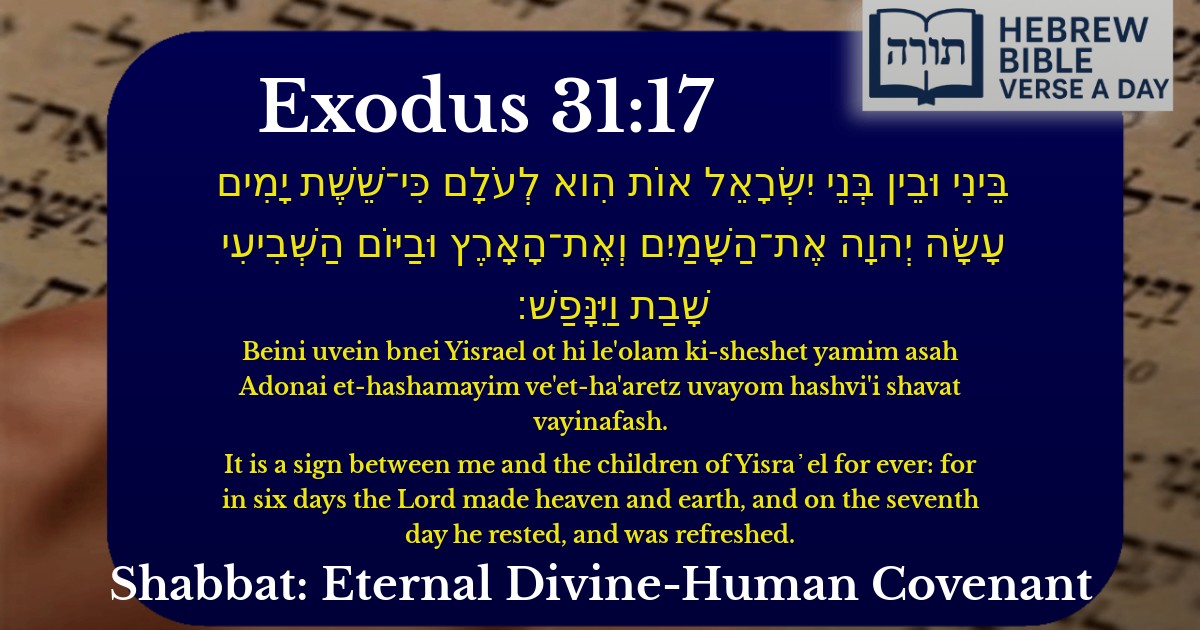Join Our Newsletter To Be Informed When New Videos Are Posted
Join the thousands of fellow Studends who rely on our videos to learn how to read the bible in Hebrew for free!
Hebrew Text
בֵּינִי וּבֵין בְּנֵי יִשְׂרָאֵל אוֹת הִוא לְעֹלָם כִּי־שֵׁשֶׁת יָמִים עָשָׂה יְהוָה אֶת־הַשָּׁמַיִם וְאֶת־הָאָרֶץ וּבַיּוֹם הַשְּׁבִיעִי שָׁבַת וַיִּנָּפַשׁ׃
English Translation
It is a sign between me and the children of Yisra᾽el for ever: for in six days the Lord made heaven and earth, and on the seventh day he rested, and was refreshed.
Transliteration
Beini uvein bnei Yisrael ot hi le'olam ki-sheshet yamim asah Adonai et-hashamayim ve'et-ha'aretz uvayom hashvi'i shavat vayinafash.
Hebrew Leining Text
בֵּינִ֗י וּבֵין֙ בְּנֵ֣י יִשְׂרָאֵ֔ל א֥וֹת הִ֖וא לְעֹלָ֑ם כִּי־שֵׁ֣שֶׁת יָמִ֗ים עָשָׂ֤ה יְהֹוָה֙ אֶת־הַשָּׁמַ֣יִם וְאֶת־הָאָ֔רֶץ וּבַיּוֹם֙ הַשְּׁבִיעִ֔י שָׁבַ֖ת וַיִּנָּפַֽשׁ׃ <span class="mam-spi-samekh">{ס}</span>
בֵּינִ֗י וּבֵין֙ בְּנֵ֣י יִשְׂרָאֵ֔ל א֥וֹת הִ֖וא לְעֹלָ֑ם כִּי־שֵׁ֣שֶׁת יָמִ֗ים עָשָׂ֤ה יְהֹוָה֙ אֶת־הַשָּׁמַ֣יִם וְאֶת־הָאָ֔רֶץ וּבַיּוֹם֙ הַשְּׁבִיעִ֔י שָׁבַ֖ת וַיִּנָּפַֽשׁ׃ {ס}
🎵 Listen to leining
Parasha Commentary
📚 Talmud Citations
This verse is quoted in the Talmud.
📖 Shabbat 118b
The verse is referenced in a discussion about the importance of observing Shabbat, emphasizing it as a perpetual sign between God and the children of Israel.
📖 Sanhedrin 58b
The verse is cited in a discussion about the universality of Shabbat observance and its significance as a covenant.


Source and Context
The verse appears in Shemot 31:17, where Hashem instructs Moshe regarding the sanctity of Shabbat as an eternal covenant between Him and Bnei Yisrael. This follows the commandment to observe Shabbat as a day of rest, emphasizing its significance as a foundational mitzvah.
Rashi's Explanation
Rashi (Shemot 31:17) explains that the phrase "אות היא לעולם" ("it is a sign forever") underscores that Shabbat is an everlasting testimony to the relationship between Hashem and the Jewish people. He notes that the six days of creation followed by the seventh day of rest serve as a perpetual reminder that Hashem created the world. Rashi also highlights that the term "וינפש" ("and was refreshed") teaches that just as Hashem "rested" in a metaphysical sense, so too must we refrain from melachah (creative labor) to emulate His divine rest.
Rambam's Perspective
In Moreh Nevuchim (2:31), the Rambam discusses Shabbat as both a commemoration of creation and a rejection of the belief in an eternal, uncreated universe. By observing Shabbat, Bnei Yisrael affirm their faith in Hashem as the Creator. The Rambam also emphasizes in Hilchot Shabbat (30:2) that Shabbat is not merely physical rest but an opportunity for spiritual elevation through Torah study and reflection.
Talmudic and Midrashic Insights
Theological Significance
This verse encapsulates the dual nature of Shabbat: historical (commemorating creation) and national (affirming the unique covenant with Israel). The Sforno adds that Shabbat serves as a weekly reminder of our purpose—to recognize Hashem’s sovereignty and live in accordance with His will. By abstaining from melachah, we testify to our belief in a Creator who shaped the world with intention.